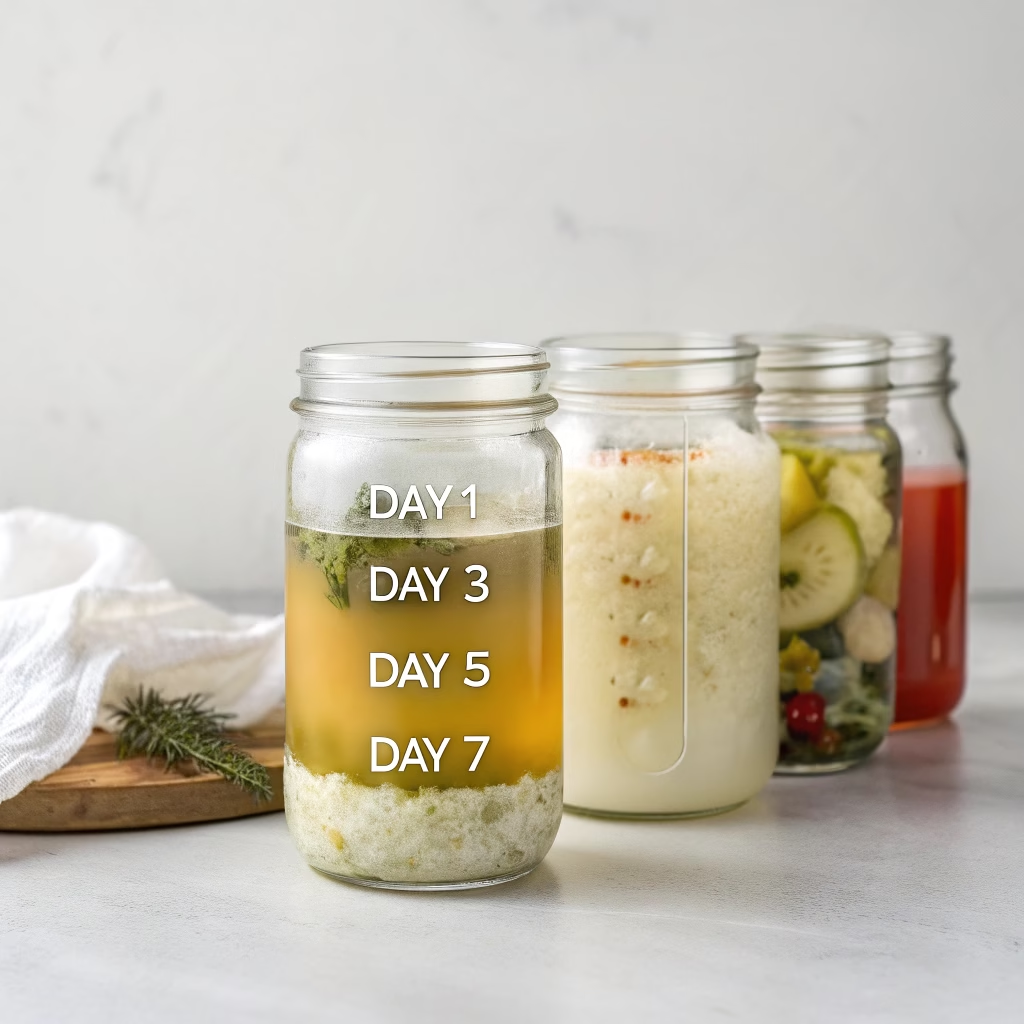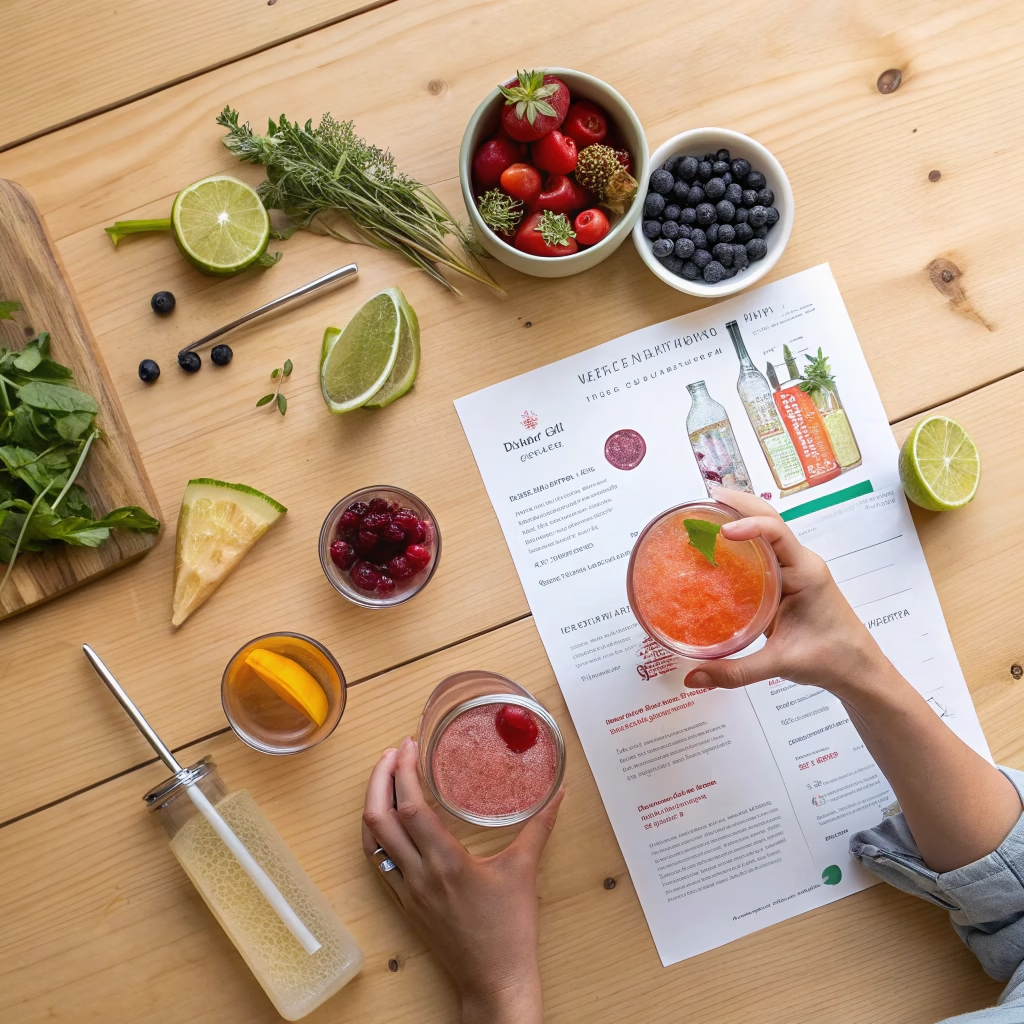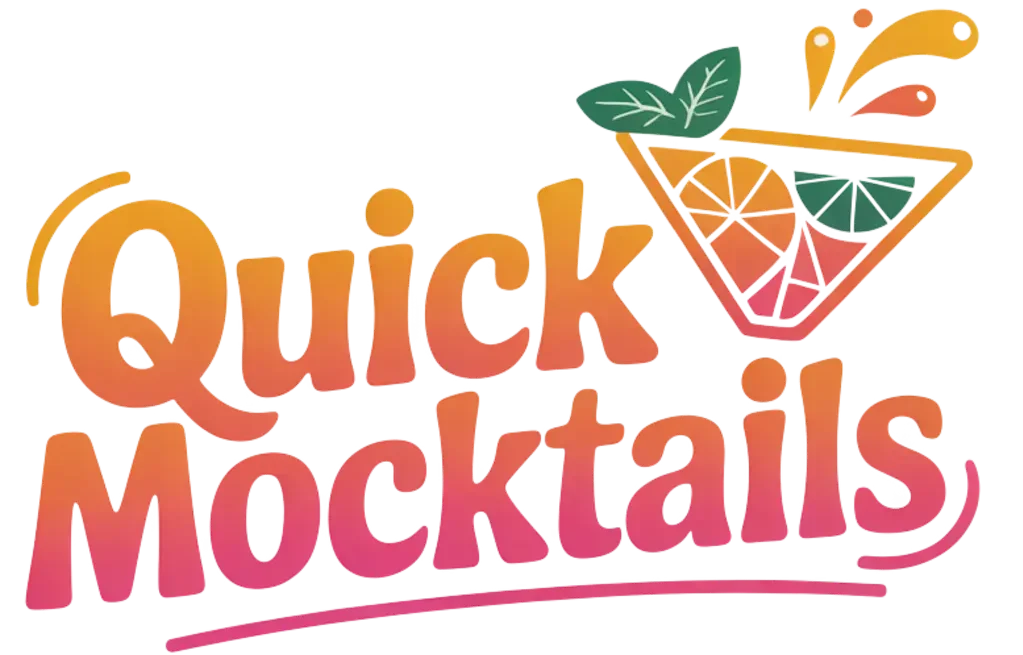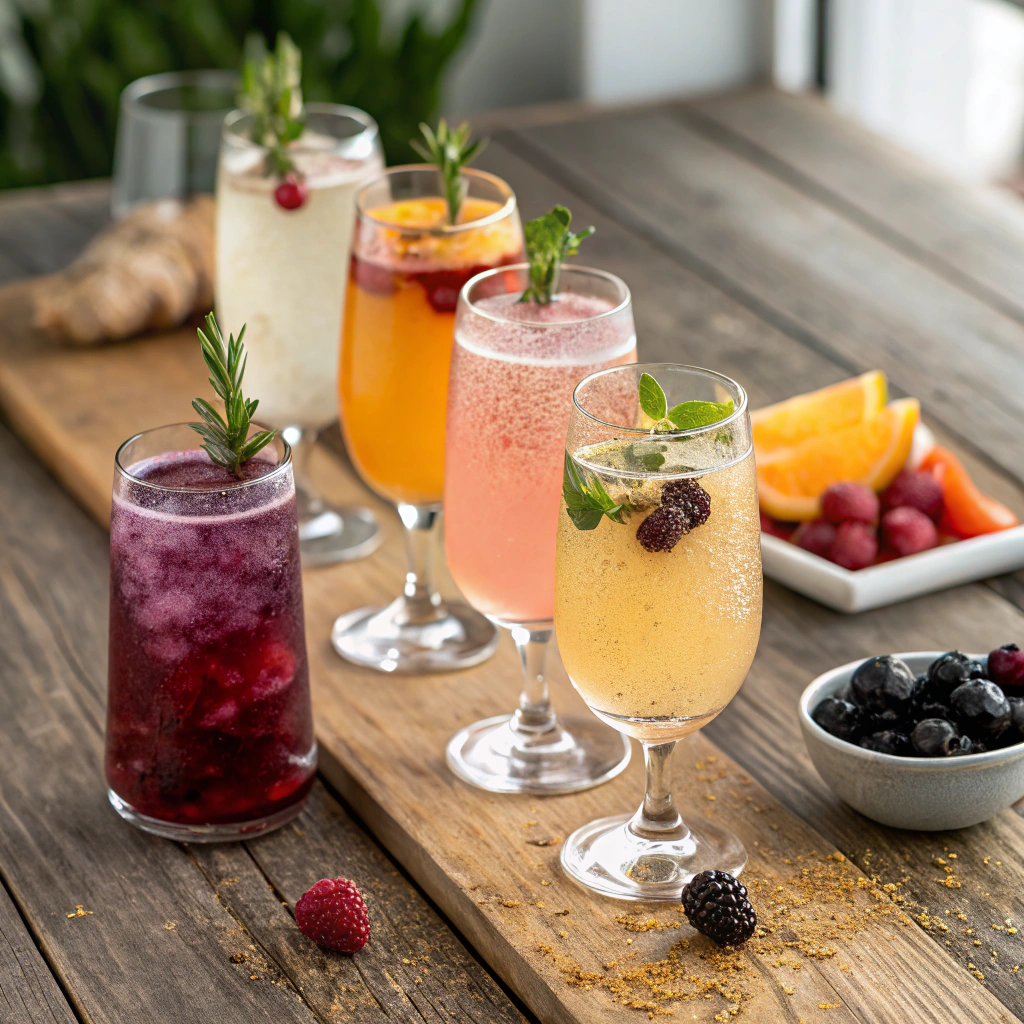Transform your kitchen into a probiotic powerhouse with fermented mocktails that rival expensive health drinks while costing pennies to make. These naturally carbonated, nutrient-rich beverages offer an incredible way to boost your gut health without artificial additives or excessive sugar. Unlike store-bought probiotic drinks that can cost $4-6 per bottle, fermented mocktails can be made at home for under $1 per serving.
The challenge many health-conscious individuals face is that commercial probiotic drinks are expensive and loaded with artificial ingredients, while homemade fermentation options seem complicated and risky. Many people worry about food safety, proper techniques, or simply don’t know where to start with the fermentation process.
This comprehensive guide will help you master the art of safe, delicious fermented mocktails with everything from basic recipes to advanced techniques. You’ll discover proven methods, safety protocols, troubleshooting tips, and creative recipes that will make you a confident home fermenter while saving money and improving your health.
Table of Contents
What Are Fermented Mocktails and Why They’re Revolutionary
Fermented mocktails represent a perfect fusion of ancient fermentation wisdom and modern health consciousness. These beverages use beneficial bacteria and wild yeasts to transform simple ingredients into complex, flavorful drinks packed with probiotics, enzymes, and nutrients that support digestive health.
Science of Fermentation in Beverages
The fermentation process involves beneficial microorganisms consuming sugars and converting them into acids, creating a naturally preserved, probiotic-rich environment. During this process, the pH drops, carbonation develops naturally, and beneficial bacteria multiply, creating a living drink that supports gut health. The historical uses of fermented beverages date back thousands of years across virtually every culture worldwide.
Probiotic Benefits vs Regular Mocktails
Traditional mocktails provide flavor and refreshment, but fermented mocktails deliver active probiotics that may improve digestion, boost immune function, and enhance nutrient absorption. While regular mocktails remain static after preparation, fermented versions continue developing beneficial compounds throughout the fermentation process.
Cultural Traditions of Fermented Drinks
From Korean kimchi juice to Mexican tepache, cultures worldwide have developed unique fermented beverages. These traditional drinks demonstrate the universal human understanding of fermentation’s health benefits, with each culture adapting local ingredients and techniques to create nutritious, flavorful beverages.
Essential Equipment and Safety for Fermenting Mocktails
Successful fermentation requires proper equipment and strict adherence to safety protocols. The right tools ensure consistent results while minimizing contamination risks that could spoil your fermented mocktails.
Must-Have Fermentation Tools
Essential equipment includes glass jars with tight-fitting lids, plastic or wooden stirring spoons (avoid metal), coffee filters or cheesecloth for covering, and pH strips for monitoring acidity levels. A kitchen scale for precise measurements and a thermometer for temperature control will dramatically improve your fermentation success rate.
Sanitation Protocols
Proper sanitation cannot be overstated in fermentation. All equipment must be thoroughly cleaned with hot, soapy water and rinsed completely. Many fermenters use a solution of one tablespoon bleach per gallon of water for sanitizing, followed by thorough rinsing. Following established food safety guidelines for fermentation ensures safe, successful batches every time.
Safety Warning Signs
Learn to recognize signs of problematic fermentation including fuzzy mold (any color), off-putting odors reminiscent of rotting vegetables, or slimy textures. Healthy fermented mocktails should smell pleasantly sour and tangy, never putrid or offensive.
5 Beginner-Friendly Fermented Mocktail Recipes
These carefully selected recipes provide an excellent introduction to fermented mocktails, offering diverse flavors while teaching fundamental fermentation principles. Each recipe includes detailed timing and troubleshooting guidance.
Ginger Bug Fizz
Create a ginger bug starter by combining 2 tablespoons fresh grated ginger with 2 tablespoons sugar and 1 cup filtered water. Feed daily with 1 tablespoon each ginger and sugar for 5-7 days until bubbling actively. For the final drink, mix 1/4 cup active ginger bug with 3 cups filtered water, 1/4 cup fresh lemon juice, and 2 tablespoons honey. Ferment 2-3 days at room temperature until fizzy. This recipe connects beautifully with other ginger-based drinks for expanded flavor options.
Elderberry Sparkler
Combine 1/2 cup dried elderberries with 4 cups hot water, steep 30 minutes, then strain. Add 1/4 cup sugar and cool to room temperature. Introduce 2 tablespoons of established ginger bug or 1/4 teaspoon wild fermentation starter. Ferment 3-5 days, tasting daily for desired sourness and carbonation levels.
Turmeric Golden Drink
This anti-inflammatory powerhouse combines 1 tablespoon fresh turmeric (or 1 teaspoon powder), 1/2 teaspoon black pepper, 1/4 cup lemon juice, 3 tablespoons maple syrup, and 4 cups filtered water. Add fermentation starter and culture 4-6 days. The black pepper enhances turmeric absorption while fermentation increases bioavailability. These healing beverages complement traditional green tea mocktails for a complete wellness beverage collection.

Rose Hip Refresher
Rose hips provide exceptional vitamin C content that survives the fermentation process. Simmer 1/2 cup dried rose hips in 4 cups water for 15 minutes, strain thoroughly, and sweeten with 3 tablespoons raw honey. Cool completely before adding starter culture. Ferment 3-4 days for optimal flavor development and probiotic activity.
Green Tea Kombucha Mocktail
Brew strong green tea using 4 bags in 3 cups hot water, steep 10 minutes, remove bags, and dissolve 1/4 cup sugar while hot. Cool to room temperature, add 1 cup starter tea from previous batch or store-bought plain kombucha. Ferment 7-10 days, then strain and bottle for secondary fermentation lasting 2-3 additional days.
Advanced Fermentation Techniques for Perfect Mocktails
Once comfortable with basic fermentation, advanced techniques enable precise control over flavor development, carbonation levels, and probiotic content in your fermented mocktails.
Temperature and Timing Optimization
Temperature dramatically affects fermentation speed and flavor development. Ideal temperatures range from 68-78°F (20-25°C) for most fermented mocktails. Higher temperatures accelerate fermentation but may produce harsh flavors, while cooler temperatures slow the process but often yield more complex, nuanced flavors. Professional home fermentation techniques emphasize temperature consistency for predictable results.
Second Fermentation Methods
Second fermentation, or “F2,” involves transferring your fermented mocktails into sealed bottles with additional flavorings for 1-3 days. This process increases carbonation while allowing flavor experimentation with fruits, herbs, or spices. Always leave 1-2 inches headspace to prevent over-pressurization.
Flavor Development Strategies
Layered flavor development involves introducing ingredients at different fermentation stages. Robust flavors like ginger or turmeric work well from the beginning, while delicate herbs and citrus zests benefit from addition during the final 24-48 hours of primary fermentation.
Troubleshooting Common Fermented Mocktail Problems
Even experienced fermenters encounter challenges. Understanding common problems and their solutions prevents waste and builds confidence in your fermented mocktail-making abilities.
Identifying Bad Batches
Spoiled fermented mocktails exhibit visible mold growth (fuzzy patches of any color), extremely foul odors, or slimy textures. Trust your senses – if something seems off, it probably is. Healthy fermentation produces pleasant, tangy aromas and clear or slightly cloudy liquids.
Fixing Under-Fermentation
Under-fermented mocktails lack carbonation and tartness. Solutions include extending fermentation time, increasing temperature slightly, adding more active starter culture, or feeding with small amounts of sugar to boost microbial activity. Patience often resolves under-fermentation issues.
Dealing with Over-Fermentation
Over-fermented drinks become too sour or develop excessive pressure. Refrigeration immediately stops fermentation, while diluting with fresh liquid can balance intense sourness. For over-carbonated drinks, carefully release pressure and refrigerate promptly.
Mold Prevention
Prevent mold through proper sanitation, maintaining appropriate acidity levels (pH below 4.6), and ensuring ingredients stay submerged beneath liquid surfaces. Salt or starter culture introduction creates hostile environments for harmful microorganisms while encouraging beneficial bacteria growth.
Health Benefits and Nutritional Value of Fermented Mocktails
The health benefits of fermented mocktails extend far beyond basic hydration, offering targeted support for digestive health, immune function, and overall wellness through their diverse probiotic populations and enhanced nutrient content.
Probiotic Strain Benefits
Different fermentation methods cultivate varied probiotic strains, each offering unique health benefits. Lactobacillus species support digestive health and may help maintain healthy cholesterol levels, while Bifidobacterium strains enhance immune function and vitamin synthesis. Wild fermentation often produces the most diverse microbial communities.
Digestive Health Improvements
Regular consumption of fermented mocktails may improve digestive efficiency, reduce bloating, and enhance nutrient absorption. The beneficial bacteria help maintain healthy gut flora balance, potentially alleviating digestive discomfort and supporting regular bowel movements. These benefits align perfectly with other healthy mocktails designed to support overall wellness.
Immune System Support
Approximately 70% of immune system activity occurs in the digestive tract, making gut health crucial for immunity. Fermented mocktails provide beneficial bacteria that support immune function while delivering antioxidants and vitamins from their whole food ingredients.
Frequently Asked Questions About Fermented Mocktails
How long do fermented mocktails take to make at home?
Most fermented mocktails require 3-7 days for primary fermentation, depending on temperature, ingredients, and desired flavor intensity. Ginger-based drinks often ferment faster (3-5 days) due to active yeasts on ginger skin, while tea-based fermented mocktails may need 7-10 days for optimal development. Second fermentation adds 1-3 additional days for enhanced carbonation.
Are fermented mocktails safe for children and pregnant women?
Properly fermented mocktails are generally safe for most people, including children. However, pregnant women should consult healthcare providers before consuming fermented beverages. These drinks typically contain trace amounts of naturally occurring compounds from fermentation, but significantly less than commercial products. Always prioritize proper fermentation techniques and sanitation.
What’s the difference between fermented mocktails and kombucha?
While both are fermented beverages, kombucha specifically uses a SCOBY (symbiotic culture of bacteria and yeast) and tea as its base. Fermented mocktails encompass a broader category including water kefir, ginger bugs, and wild fermentation methods using diverse ingredients beyond tea. The fermentation processes and resulting flavor profiles differ significantly.
How do I know if my fermented mocktail has gone bad?
Warning signs include visible mold (fuzzy growth of any color), putrid odors resembling rotting food, slimy textures, or extremely off-putting tastes. Healthy fermented mocktails smell pleasantly tangy and taste sour but not offensive. When in doubt, discard questionable batches and start fresh.
Can I make fermented mocktails without a starter culture?
Yes! Wild fermentation relies on naturally occurring yeasts and bacteria present on ingredient surfaces and in the environment. This method takes longer and requires more careful monitoring but often produces the most complex flavors. Ginger bugs and fruit-based starters can be created from scratch using this wild fermentation approach.

Fermented mocktails offer an exceptional combination of health benefits, cost savings, and culinary creativity that makes them an invaluable addition to any wellness-focused lifestyle. These probiotic-rich beverages provide natural carbonation, complex flavors, and beneficial bacteria while costing a fraction of commercial alternatives.
Success with fermented mocktails depends on proper safety techniques, quality ingredients, and patience during the fermentation process. Start with simple recipes to build confidence, then gradually experiment with advanced techniques and unique flavor combinations. Remember that fermentation is both art and science – embrace the learning process and celebrate small victories.
Begin your fermentation journey today with the beginner-friendly ginger bug fizz recipe. Track your progress, note flavor developments, and share your experiences with fellow fermentation enthusiasts. Your gut health and taste buds will thank you for this delicious, nutritious addition to your beverage repertoire.

